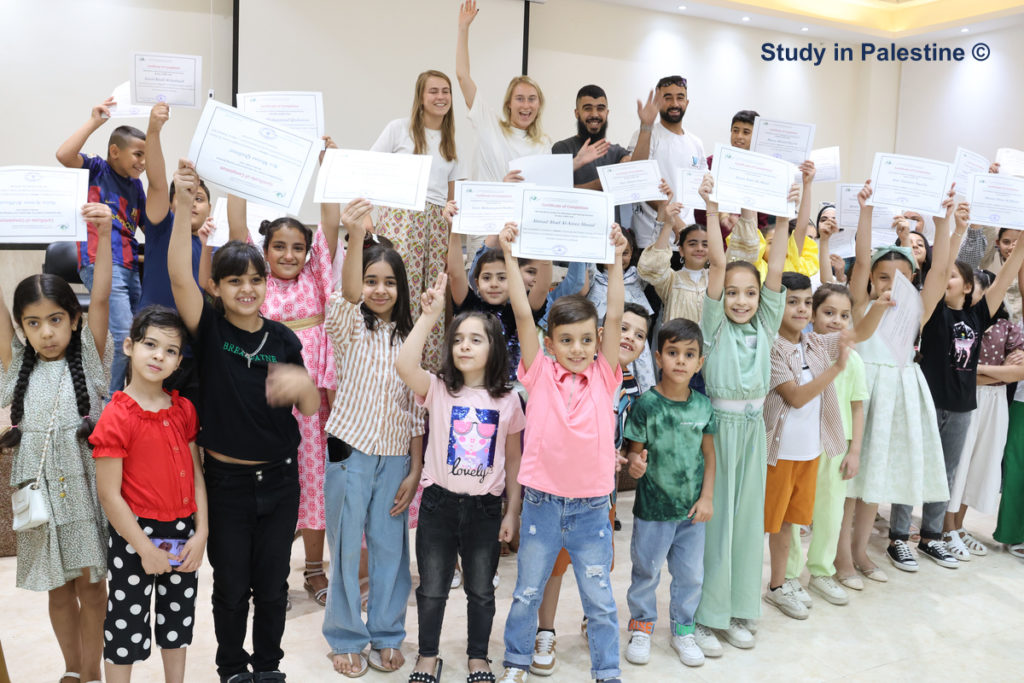Exploring and Mastering Palestinian Arabic by Study in Palestine: Embarking on a journey towards mastering Palestinian Arabic is not just about acquiring a new language; it’s about immersing yourself in a vibrant culture, connecting with diverse Palestinian communities, and unlocking doors to a deeper understanding of the Middle East. Palestine, with its ancient ruins, bustling markets, and breathtaking natural wonders, offers a tapestry of experiences waiting to be discovered.
Mastering Palestinian Arabic isn’t merely about learning words and phrases; it’s about gaining insight into the values, traditions, and way of life that shape the fabric of Palestinian society. It’s about engaging with locals in their native language, sharing stories, exchanging ideas, and forging connections that transcend linguistic barriers.
Moreover, learning Palestinian Arabic opens up avenues for meaningful interaction and collaboration with Palestinians from all walks of life. Whether you’re a traveler seeking authentic experiences, an entrepreneur looking to establish connections in the region, or a student eager to explore academic opportunities, proficiency in Palestinian Arabic equips you with the language skills and cultural understanding necessary to navigate the complexities of Palestinian society with confidence and respect.
Table of Contents
The Palestinian Dialect
The Palestinian dialect (اللهجة الفلسطينية) is the everyday spoken language and will be understood by the Palestinian people. Some of the words in Modern Standard Arabic are not used in day-to-day conversation and some people may not understand the more formal language.
| Native speakers | 13 Million Palestinians |
| Language family | Afro-Asiatic > Semitic |
| Dialects | Fellahi; Madani |
| Writing system | Arabic alphabet |
| Dialect varieties | Intelligible varieties of Levantine Arabic |
Palestinian Arabic is Closely Related to Modern Standard Arabic
Palestinian Arabic is the predominant dialect spoken by Palestinians residing in Palestine, Israel, and Palestinian diaspora communities. Mastering Palestinian Arabic can significantly facilitate communication and interaction with Palestinians in their daily lives when traveling in Palestine.

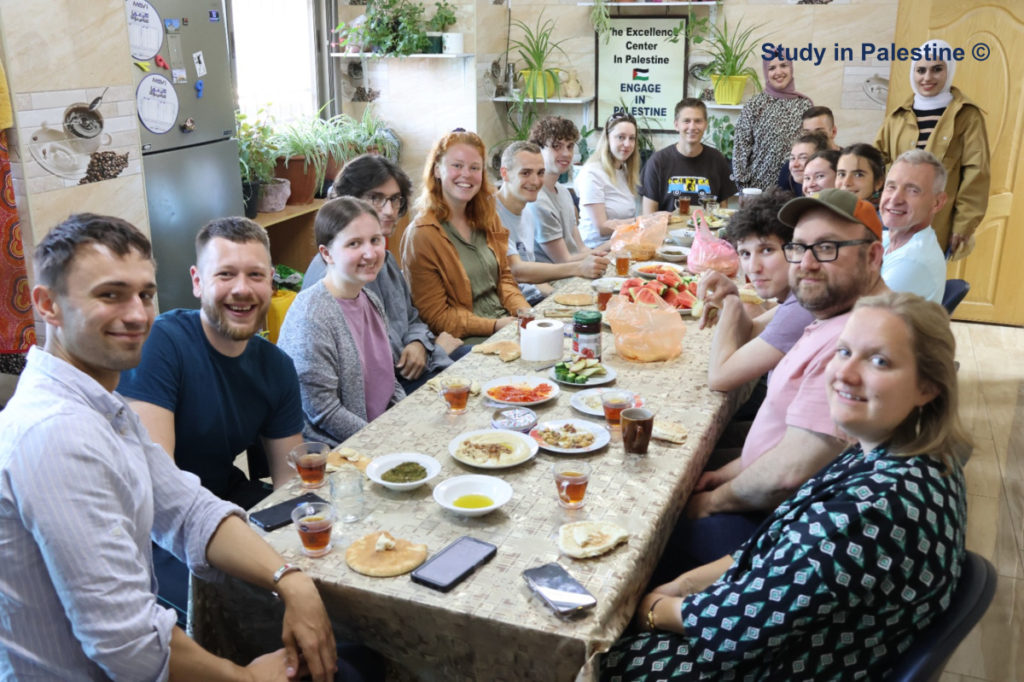
The Arabic dialects spoken in Palestine display a significant diversity rather than forming a single homogeneous linguistic unit. This diversity arises from various typological groupings shaped by geographical, historical, and socioeconomic factors. In two comparative studies of dialects, Palestinian Arabic emerged as the closest to Modern Standard Arabic, with the dialect spoken in the Gaza Strip being the primary exemplar.
In essence, mastering Palestinian Arabic is a gateway to a world of discovery, connection, and cultural enrichment. It’s an invitation to embark on a transformative journey of exploration and understanding, where language serves as the bridge that brings people together, fosters mutual respect, and celebrates the beauty of diversity. So, as you embark on this linguistic adventure, embrace the opportunity to not only learn a language but to immerse yourself in a rich tapestry of Palestinian culture, history, and human connection that Palestine has to offer.
1. Learn Arabic Alphabet
The Palestinian Arabic alphabet, commonly known as the Arabic abjad, is crafted for writing the Levantine Arabic language spoken in regions like Jordan, Lebanon, and Syria. It aligns with the standard Arabic script, recognized for its right-to-left cursive style, and encompasses 28 letters, with certain letters showcasing contextual variations. Click on this link to explore a detailed overview of the alphabet’s usage and pronunciation in different positions within Arabic words.
2. Explore Learning Resources
Start by researching and collecting resources designed for learning Palestinian Arabic. Seek out textbooks, online courses, language learning apps, and audio resources that specifically target Levantine Arabic, including Palestinian dialects. Resources such as “Colloquial Palestinian Arabic: An Introduction to the Spoken Dialect” by Nasser Isleem and “Conversational Arabic Quick and Easy” by Yatir Nitzany provide structured lessons tailored to Palestinian Arabic.
Additionally, online platforms like “ArabicPod101” offer comprehensive Arabic lessons along with cultural insights to enhance your learning experience.
3. Watch Videos on YouTube
Watching Palestinian Arabic videos on YouTube is an excellent method that can take you far on your journey towards mastering Palestinian Arabic. Channels such as “Learning Palestinian Arabic” and “Learn Arabic with Maha” offer valuable resources.
4. Engage in Conversational Practice
Practice speaking with native speakers as much as possible. Seek out opportunities to converse with Palestinians, either in person or through language exchange programs online.
Joining language exchange meetups, finding conversation partners on social media or language exchange apps, and participating in online forums can all provide valuable opportunities to practice speaking, listening, and understanding Palestinian Arabic in real-life contexts.
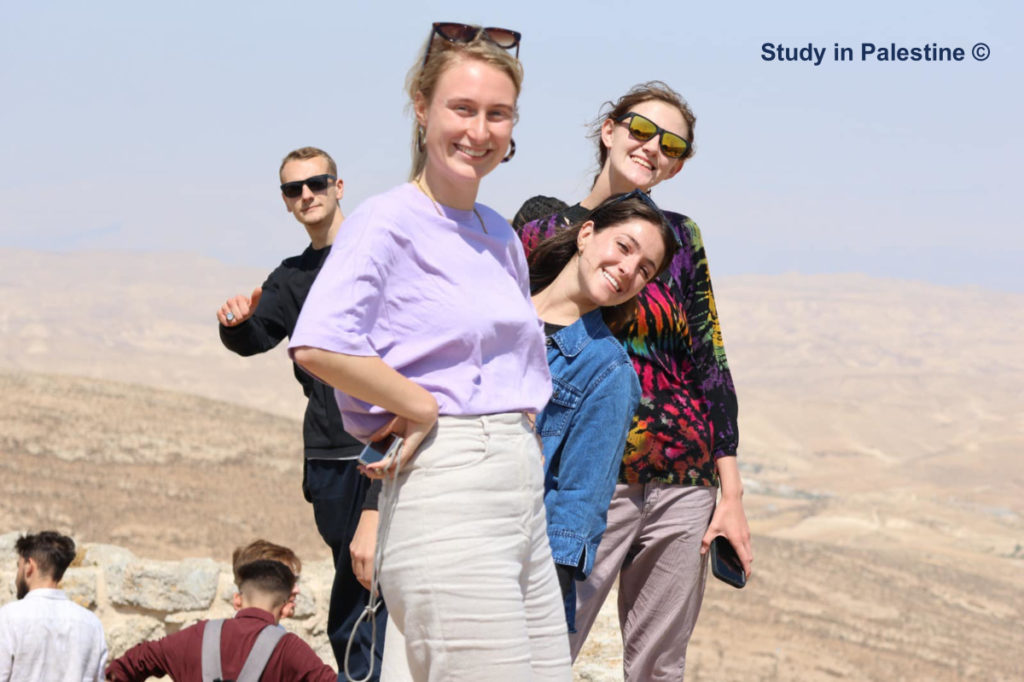
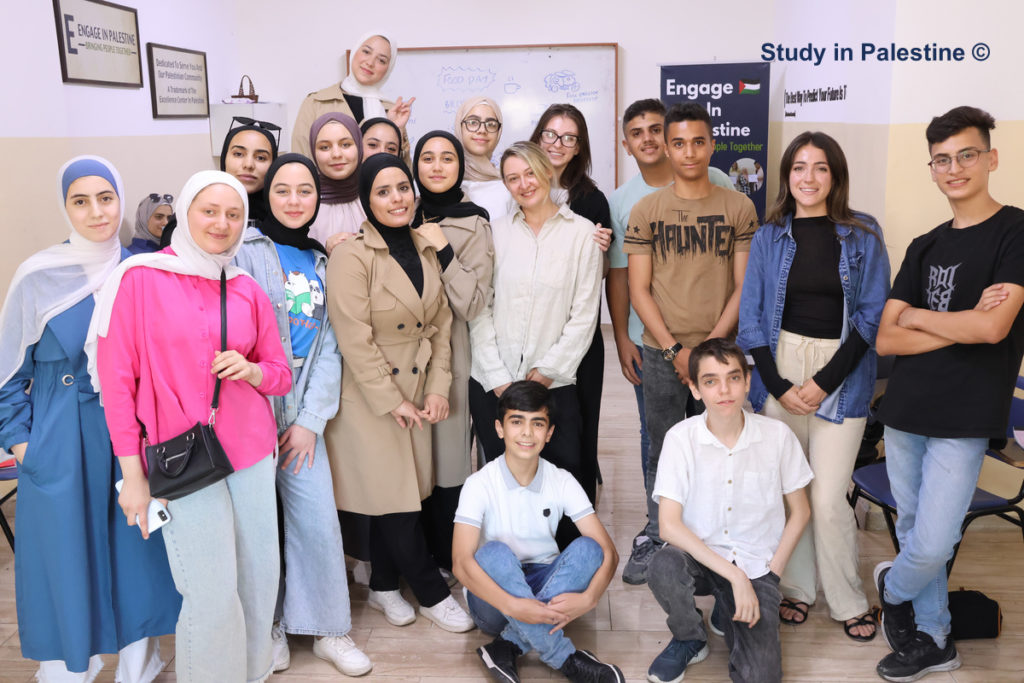
5. Immerse Yourself in the Language
Immerse yourself in Palestinian Arabic by exploring authentic cultural materials. Enjoy the soulful melodies of Palestinian singers like Mohammed Assaf and delve into thought-provoking films such as “Gaza Mon Amour” and “Lemon Tree.”
Tune in to Palestinian radio stations like Yaboos.fm for everyday conversations in Arabic. Expand your vocabulary and understanding by reading newspapers like Al-Quds and browsing websites like Maannews.net. Through these experiences, you’ll deepen your language skills and also gain valuable insights into Palestinian culture and society.
6. Familiarise Yourself with the Arabic Script
While spoken communication is primary in learning Palestinian Arabic, gaining proficiency in reading and writing the Arabic script can greatly enhance your language skills. Invest time in learning the Arabic alphabet, practicing writing Arabic letters, and reading simple texts.
Apps like Duolingo, Memrise, and Mondly offer Arabic language courses that include Palestinian Arabic lessons on the Arabic script. These apps provide interactive exercises and quizzes to help you practice writing Arabic letters.
7. Stay Motivated and Consistent
Learning a new language requires dedication and persistence. Set realistic goals for your Arabic language learning journey and establish a regular study routine. Consistency is key, so make a habit of practicing Palestinian Arabic daily, even if only for a short time.
Celebrate your progress along the way and stay motivated by focusing on your achievements and the benefits of mastering the language, whether it’s for travel, work, or personal enrichment. Remember that language learning is a gradual process, and every step you take brings you closer to fluency.

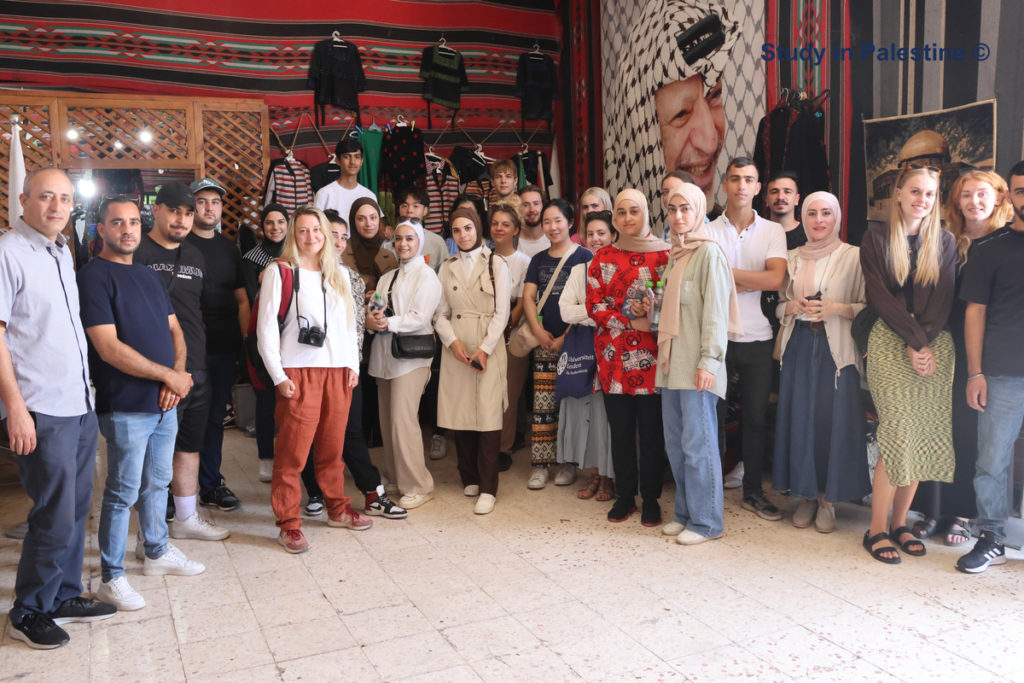
Our Courses
Study Arabic Language, we offer a diverse range of Arabic language programs tailored to meet the unique needs and interests of our students. Whether you are looking for intensive on-site courses, specialized programs focusing on media or politics, or the flexibility of online learning, we have something for everyone. Below, you will find detailed tables outlining our course offerings, designed to help you choose the program that best fits your goals and schedule. Dive into our course options and start your journey towards mastering the Arabic language today.
Studying Arabic Programs
| Intensive Arabic Courses (1-13 Weeks) | Intensive Levantine Arabic |
| Intensive Palestinian Arabic | Intensive Modern Standard Arabic |
| Summer Intensive Arabic program | Online Arabic Classes |
Online Courses
| Online Arabic Classes | Online Course on Palestinian Refugees |
| Online Course on Human Rights | Study Palestinian Arabic Online |
| Online Course on Palestinian Law |
Our Success
Study in Palestine has proudly earned several Community Awards, as it was recognized as the Best Language School in the Middle East, Affordable Arabic Programs in Palestine Provider, and the Top Provider of Volunteer and Internship Opportunities abroad for the years 2019, 2021, 2022, 2023, and 2024. For further details, please visit our profiles on GoOverseas.com and GoAbroad.com.
- +890 Reviews and ratings (96.8%) on gooverseas.com
- +190 Reviews and ratings on goabroad.com
- Participants’ video testimonials
Where Else Can You Study Arabic in Palestine?
You’re interested in learning not just facts about the Arabic language, but mastering the language itself, and you don’t know where? The West Bank is one of the best choices for studying Arabic. Palestinians love meeting new people, introducing their Arabic culture, and supporting students in any way they can. Furthermore, the spoken Arabic in Palestine is Levantine Arabic, which is the closest to Modern Standard Arabic.
This is why it makes Palestine a great place to study Arabic. Additionally, there are many intensive Arabic programs with great reviews at affordable prices. Below, we will offer some of the best language centers and organizations that offer Arabic lessons in Palestine and which can help you master the Arabic language in no time.
1. Travel to Palestine
The Travel to Palestine organization aims to enable tourists to come to Palestine and experience its rich culture. This is a land rich with history, hospitality, and generous people, and you can experience all of that through the Travel to Palestine organization. They offer intensive Palestinian Arabic courses as well as online lessons.
2. Excellence Center
The Excellence Center in Palestine has the experience of more than 13 years of offering Arabic programs (Levantine Arabic, Modern Standards Arabic as well as Ammiyya Arabic) for nonnative speakers in the West Bank, founded in Hebron in 2011, serves as a language school offering Arabic language education to international students, interns, and volunteers. It also provides cultural immersion activities and community development services to Palestinian children, refugees, youth, women, and community members in Hebron.
3. Salam Palestine
Salam Palestine, a community project in Hebron, Palestine, works with international volunteers to facilitate social and community development initiatives. Through workshops, events, and outreach programs, volunteers collaborate with residents to promote cultural exchange and improve social cohesion. The Center offers super intensive, intensive, and non-intensive Arabic courses for people who would like to stay for 1-13 weeks.
4. Engage In Palestine
Engage in Palestine, based in Hebron, offers immersive experiences for international students who would like to go to Palestine and study Arabic in the West Bank. It is known for its Levantine (Shami) and Palestinian Arabic intensive lessons. Through diverse Arabic programs, participants engage in educational, social, and cultural initiatives, working alongside residents to support youth empowerment, women’s initiatives, and the well-being of Palestinian refugees.
5. Volunteer In Palestine
Volunteer in Palestine offers Levantine, Palestinian, and Modern Standard Arabic courses at different levels such as super-intensive, intensive immersion as well as non-intensive programs for anyone interested in studying Arabic in the West Bank, Palestine. The organization has a lot of reviews and it is known for its community development programs.
6. Study In Palestine
Study in Palestine offers a broad range of options, including intensive Arabic courses and summer Arabic programs at multiple levels, designed to help you on your quest towards mastering Palestinian Arabic. These Arabic programs cover super-intensive, intensive immersion, and non-intensive Arabic choices, designed for those looking to study Levantine (Shami Arabic), Palestinian dialects, and Modern Standard Arabic in the West Bank, Palestine.
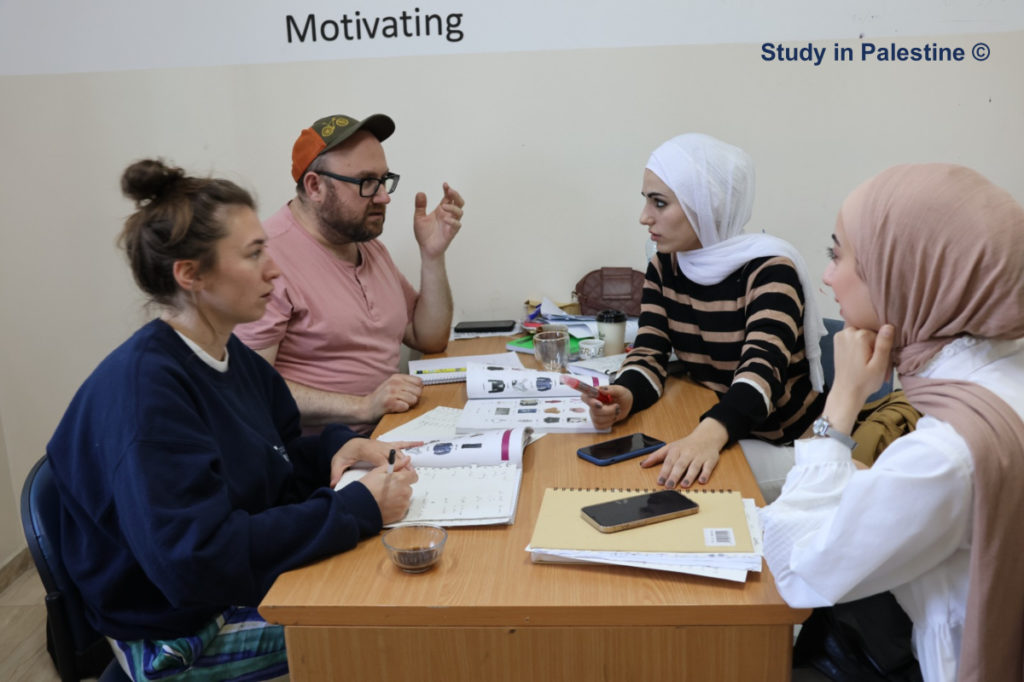

Conclusion
Mastering Palestinian Arabic offers far more than just linguistic proficiency. It opens doors to a deeper understanding of Palestinian culture, history, and identity. Through dedication to learning—whether through immersive experiences, structured courses, or online resources—learners not only acquire language skills but also gain insight into the rich tapestry of Palestinian society.
By engaging with Palestinian Arabic, learners forge connections with native speakers, access authentic cultural content, and navigate the complexities of the region with greater empathy and understanding. Ultimately, the journey to mastering Palestinian Arabic is a rewarding endeavor that fosters not only linguistic fluency but also cultural appreciation and meaningful cross-cultural exchange.
Contact Us
Should you have any questions, please do not hesitate to contact us at:
WhatsApp: +972 599 479 880
Website: https://ecpalestine.org/
EC Website: https://excellencenter.org/
Instagram: https://www.instagram.com/excellence.center
Facebook page: https://www.facebook.com/ExcellenceCenter
